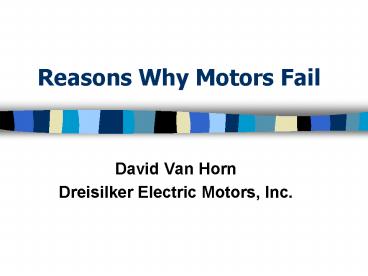Reasons Why Motors Fail
1 / 15
Title: Reasons Why Motors Fail
1
Reasons Why Motors Fail
- David Van Horn
- Dreisilker Electric Motors, Inc.
2
Motor Failures are a major source of production
downtime in most industrial plants. Frequently,
the cost of production downtime is higher than
the expense involved with the repair or
replacement of the motor. Many motor failures can
be averted, or at least the useful life of the
motor can be extended. An important part of this
process is knowing why motors fail. Generally,
sources of motor failures can be attributed to
one of the following causes.
3
1 - BEARING FAILURE
Bearing Failures are one of the most common
causes of motor failures. Up to one-half of all
motor burnouts have been caused by a bad bearing.
Typical problems include improper lubrication,
misalignment, replacement with the wrong bearing,
excessive loading, and most of all, grease
incompatibility which leads to
4
2 - VIBRATION
Excessive vibration can cause bearing failure,
metal fatigue of parts or failure of windings.
The cause of vibration is usually mechanical,
such as excessive belt tension, defective ball or
sleeve bearings, misalignment, and improper
balance. The most common cause is the unbalance
of a rotating member - the motor rotor, rotating
load, or some component in the drive train. The
motor is the first to be accused and the last to
be at fault. Electrical problems can also cause
vibration. Modern vibration analysis equipment
simplifies the task of vibration analysis and
dynamic balancing.
5
3 - HARSH ENVIRONMENT
Frequently, excessive temperature is a cause of
motor failure. For every 10 degrees a motor is
operated above its rating, the insulation life of
the motor is halved. Sources of elevated
temperature must be found and eliminated. These
sources could include misalignment, overload,
incorrect voltage, and many others. Other
harmful environments include corrosive fumes or
vapors, salt-laden air, excessive dirt, dust,
moisture, high humidity and direct exposure to
water.
6
4 - IMPROPER MOTOR SELECTION/APPLICATION
Sometimes the misapplication is so minor that the
motor survives for a significant time. There are
numerous factors to consider. As as example, a
severe duty cycle could cause premature motor
failure. Jogging, plugging and long acceleration
cause the motor to run at lower-than-normal
speeds.
7
5 - INADEQUATE INSTALLATION
Faults in motor mounting can cause motors to
fail. If mounting bolts are not tightened or not
sized properly, misalignment or vibrations occur,
resulting in bearing and shaft failures and
eventual winding burnout. Couplings, belts,
sheaves and any other connections between the
motor and driven load must be aligned correctly
to avoid excessive vibration that is so damaging
to motors.
Faults in motor mounting can cause motors to
fail. If mounting bolts are not tightened or not
sized properly, misalignment or vibrations occur,
resulting in bearing and shaft failures and
eventual winding burnout. Couplings, belts,
sheaves and any other connections between the
motor and driven load must be aligned correctly
to avoid excessive vibration that is so damaging
to motors.
8
6 - ELECTRICAL PROBLEMS
Incorrect supply voltage to a motor will shorten
life and could cause rapid failure if voltage
deviation is excessive. Low voltage will cause
higher-than-normal current. If the voltage
decrease is severe enough,
the excessive current will cause
the motor to overheat.
9
7 - UNBALANCED
VOLTAGES
Unbalanced 3-phase voltages to a motor can result
in a very high current unbalance. Very high
motor currents can occur, resulting in fast
overheating. Protection must be provided against
this kind of problem, and overload relays usually
can do the job.
10
8 - INADEQUATE
MAINTENANCE
Frequently, basic preventive maintenance could
prevent or at least delay the failure of a motor.
Certainly not all motors need or deserve
preventive maintenance, particularly where the
maintenance costs would exceed the cost of that
motor failure. On the other hand, where the
motor is applied in a critical application or is
large, expensive or hard to replace, then a
preventive maintenance program is well justified.
11
9 - MECHANICAL FAILURE
An excessive load can quickly result in motor
failure. The motor may have been properly sized
for its load initially however, a change in the
load, or in the connecting drive, could result in
overloading of the motor. Bearings may begin to
fail, gears may begin to bind, or any source of
additional friction or load can occur. When this
happens, the motor will draw additional current,
resulting in increased motor temperature. If the
motor current exceeds rated full-load current for
any length of time, the overheating will shorten
motor life. Very high overcurrents should trip
the overload relays if they have been properly
sized.
12
Last but not least.
13
10 - MOTOR REPAIR
An approach to failure must be positive,
pro-active, and work towards Root Cause Analysis.
You must work/partner with your motor repair
service center. Proper diagnosis, disassembly
and inspection is an important first step.
Mechanical fits and shaft journals must be
measured. If windings are defective, you should
find out the method of stripping. Many practices
harm the integrity of the laminations.
14
10 - MOTOR REPAIR
Exact wire size, method of coil winding,
insulation, and varnishing methods must be looked
at. In-House Machining capabilities, practices
and balancing is a consideration to also take a
close look at. Most important of all, it is your
motor going in for repair. You must be
responsible for choosing the right shop.
15
For more information about Dreisilker Electric
Motors, Inc. visit our Web Site
at http//www.dreisilker.com e-mail
dreisilk_at_dreisilker.com or phone 630/469-7510































